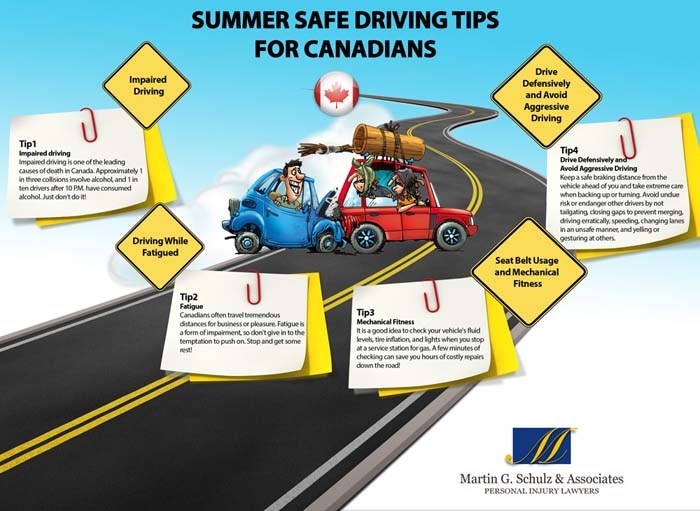The August long weekend is fast approaching which means an increase of traffic on our highways. Trailers, boats, and motorhomes continue to be a common sight. “It’s important for motorists to remain focused, drive responsibly and with a positive attitude,” said Christine Niemczyk, Director of Communications, CAA Saskatchewan. “Let’s also remember to not text while driving and consider appointing a passenger to handle phones and navigation systems,” she added. Summer also means road construction season so motorists are reminded to slow down to 60 km per hour when passing highway construction zones, emergency vehicles, and tow truck operators assisting motorists.
Here are few more safe driving tips from CAA Saskatchewan:
Drivers:
•Get plenty of rest before you head out for your long drive.
•Plan your route to allow time to travel safely and check for road construction to avoid delays.
•Do not drink and drive.
•Pack an emergency vehicle kit (flashlight, booster cables, tire puncture sealant, first-aid kit, flares, drinking water, cell phone with batteries and charger for emergency calls, etc.).
•Ensure all vehicle passengers wear seat belts and that child car seats and booster seats are in working condition.
•Eliminate distractions and remember all Canadian provinces have banned the use of hand-held communications devices behind the wheel.
Drivers Towing a Trailer:
•Know the towing capacity of your vehicle. This information can be found in the vehicle owner’s manual. Also review the owner’s manual for the trailer to determine the weight of the trailer. Make sure the weight of the trailer does not exceed the towing capacity of the tow vehicle. Never overestimate this capacity because a load that is too heavy could damage certain parts of the towing vehicle and pose a serious risk to the safety of other road users.
•Take into account the extra size and weight of the trailer when driving. Be extra cautious when changing lanes, accelerating or making turns, and especially when slowing down since the load being pulled will greatly affect the vehicle’s performance and could significantly increase the distance required to stop in case of an emergency.
•Motorists should also ensure that the trailer is securely attached to the vehicle and be sure to check this regularly throughout the trip. Check to make sure the trailer ball is tight and use safety chains. Since backing up with a trailer or camper is more difficult, it is best to be prepared in case there is a need to do this. If the driver is unsure whether he or she will be able to reverse safely with a trailer, it is recommended that they practice in a quiet area – ideally far from all traffic – before starting a trip.
Trailer and Motorhome Care:
•Inspect and or grease wheel bearings and leaf spring assemblies. CAA Saskatchewan receives a large number of roadside assistance requests for motorhomes and trailers that have wheel bearing problems, broken leaf spring on their trailer suspension and tire problems. Seized wheel bearings and broken leaf springs make it very difficult to tow the trailer long distances.
•Check the tires on your trailer and motorhome as they tend to be parked for extended periods which causes deterioration from age, UV rays and weather elements. Tires that are old or have cracks and bulges in them should be inspected further and perhaps replaced.
•Also check the wheel bearings/wheel lug nut and all fluid levels before heading out on a trip.
•Make sure the wheel lug nuts are torqued to specifications. CAA does service a large number of roadside assistance calls for motorhomes and trailers that have lost the tire and wheel assemblies while driving on the highway because the lug nuts became loose which can be very dangerous for everyone on the road.
•Motorhomes should be inspected every year to see if there are any mechanical problems prior to any trips. Coolant hoses and broken fan belts are common problems with these types of RVs.
Vehicle Care:
•Check your vehicle’s tire pressure (including the spare) and fluid levels (motor oil, brake fluid, windshield washer fluid).
•Take advantage of the qualified staff at the CAA Car Care Centres or Approved Auto Repair Service (AARS) facilities to have your vehicle inspected in advance of your road trip.
•Remember CAA Roadside Assistance is available 24 hours day in Canada and the United States.




